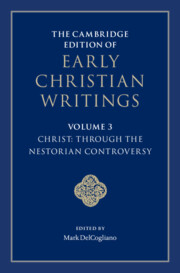Book contents
- The Cambridge Edition of Early Christian Writings
- The Cambridge Edition of Early Christian Writings
- The Cambridge Edition of Early Christian Writings
- Copyright page
- Contents
- Notes on Contributors
- Acknowledgments
- Note on the Texts and Translations
- Abbreviations
- Series Introduction
- Introduction
- Part I The Beginnings of Christology
- 1 Ascension of Isaiah 6–11 (Ethiopic Version)
- 2 The Gospel of Peter
- 3 The Epistle of the Apostles
- 4 The First Letter of Clement (Selections)
- 5 Ignatius of Antioch, Letters (Selections)
- 6 Epistle to Diognetus 1 and 7–12
- 7 Justin Martyr, First Apology 23, 30–32, 46, 63 and Second Apology 10, 13
- 8 Tatian, Address to the Greeks 4–7
- 9 Odes of Solomon 7, 19, 41, and 42
- 10 Treatise on Resurrection
- 11 A Ptolemaic Theology as Recounted by Irenaeus of Lyons in Against Heresies 1.8.5
- 12 Irenaeus of Lyons, Against Heresies (Selections)
- Part II Developing Christological Traditions
- Part III Traditions of Pro-Nicene Christology
- Part IV Controversy over Nestorius
- Suggestions for Further Reading
- Scriptural Index
3 - The Epistle of the Apostles
from Part I - The Beginnings of Christology
Published online by Cambridge University Press: 05 February 2022
- The Cambridge Edition of Early Christian Writings
- The Cambridge Edition of Early Christian Writings
- The Cambridge Edition of Early Christian Writings
- Copyright page
- Contents
- Notes on Contributors
- Acknowledgments
- Note on the Texts and Translations
- Abbreviations
- Series Introduction
- Introduction
- Part I The Beginnings of Christology
- 1 Ascension of Isaiah 6–11 (Ethiopic Version)
- 2 The Gospel of Peter
- 3 The Epistle of the Apostles
- 4 The First Letter of Clement (Selections)
- 5 Ignatius of Antioch, Letters (Selections)
- 6 Epistle to Diognetus 1 and 7–12
- 7 Justin Martyr, First Apology 23, 30–32, 46, 63 and Second Apology 10, 13
- 8 Tatian, Address to the Greeks 4–7
- 9 Odes of Solomon 7, 19, 41, and 42
- 10 Treatise on Resurrection
- 11 A Ptolemaic Theology as Recounted by Irenaeus of Lyons in Against Heresies 1.8.5
- 12 Irenaeus of Lyons, Against Heresies (Selections)
- Part II Developing Christological Traditions
- Part III Traditions of Pro-Nicene Christology
- Part IV Controversy over Nestorius
- Suggestions for Further Reading
- Scriptural Index
Summary
The Latin title, Epistula Apostolorum, was suggested by Carl Schmidt, the first editor of this previously unknown work. In chapter 2 eleven apostles are indeed named as the collective authors of this work, addressed to the entire worldwide Christian community, but its contents do not correspond to the apostolic or pseudo-apostolic letters of the New Testament. The major part of the Epistula records a dialogue supposed to have taken place on Easter morning in which Jesus answers questions put to him by his disciples in preparation for their future mission. The dialogue occurs within a narrative frame that includes a collection of miracle stories from Jesus’s childhood and ministry (chapters 4–5), a version of the empty tomb story together with an appearance to female and male disciples (chapters 9–12), and a concluding ascension narrative unrelated to the more familiar version in Acts (chapter 51). In many respects this text is more like a gospel than an epistle.
Information
- Type
- Chapter
- Information
- The Cambridge Edition of Early Christian Writings , pp. 21 - 43Publisher: Cambridge University PressPrint publication year: 2022
